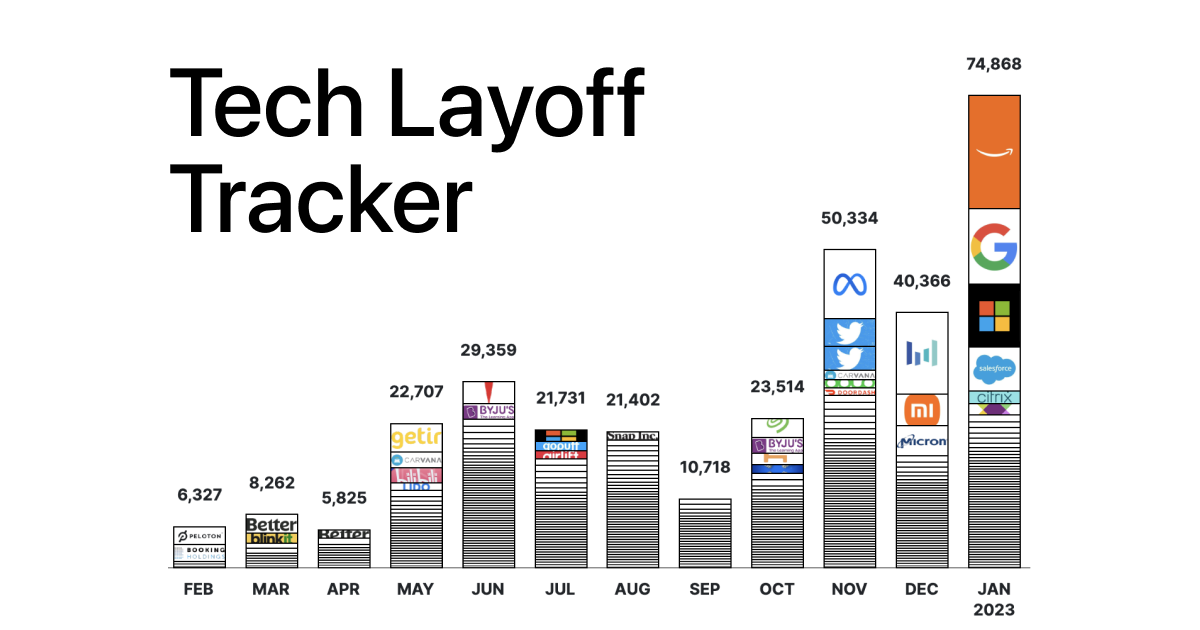
Are we in a recession or aren’t we?
I leave the speculation (and arguments about semantics) to economists and TV panels. What I know is that the situation is complicated for the working person: companies are firing people wholesale, inflation is brutal, essential goods are painfully expensive, and debt is a huge burden.
For many people, it’s hard to find silver linings. But, it is often in such times that unforeseen opportunities present themselves.
Consider the Covid lockdowns of 2020. They taught a whole generation that they can, in fact, work from home. Then the layoffs came and it taught many that they can, in fact, find new ways to sell their skills.
I have a feeling that the next two years might teach many that they can, in fact, be successful freelancers.
The mother of invention
It won’t necessarily be a willing transition. Many tech workers are already turning to freelancing out of necessity - after losing their corporate jobs, many turned to online freelance platforms.
The last year was brutal for big tech employees, who experienced first-hand how fragile their cushy gigs really are.

What can hundreds of thousands of newly unemployed tech workers do in 2023? They can:
- Look for a new job. A complicated prospect right now, if they’re looking for anything resembling their previous salary.
- Start their own company. Necessity is the mother of invention, and many entrepreneurial journeys started with the question “what will I do with my time now?”. The problem is that you need to cover living expenses while building your startup.
- Go freelance. The most robust option of the three - flexible hours allow you to build your own startup in your spare time, learn new skills, or look for another $200k/year corporate gig if that’s your thing.
For better or for worse, the global pool of freelancers is about to welcome another batch of ex-FAANG folks - developers, designers, copywriters, and marketers.
Competition, so what?
This may sound like a problem for other freelancers. New competition from reputable ex-big-tech personnel seems troubling on the surface.
But worry not. When big companies do layoffs, three things invariably happen:
- They over-correct and soon after have to plug the holes with freelance talent.
- Many smaller companies get scared and restrain from hiring full-time employees. So they, too, turn to freelancers.
- Many laid-off employees won’t
 Should You Quit Your Job and Become a Freelancer?go freelance - they will choose one of the other two options listed in the previous section.
Should You Quit Your Job and Become a Freelancer?go freelance - they will choose one of the other two options listed in the previous section.
The pain of increased competition is thus not nearly as great as it may seem at first glance. The increased supply of freelancers is offset by the increased demand for freelance workers.
Also, experience counts. A self-taught web developer with five years of freelance experience is more likely to find freelance work than ex-Google employees who have never reached out to clients in their life. Technical skills be damned, if you can’t  How I Write Proposals That Win As Many Freelance Clients As I Wantwrite great proposals you’re gonna have trouble finding freelance work.
How I Write Proposals That Win As Many Freelance Clients As I Wantwrite great proposals you’re gonna have trouble finding freelance work.
Speed up when everybody’s slowing down
With that out of the way, I want to take my argument one step further: there is an inherent opportunity for freelancers in economic downturns. Let me explain.
In recessions, people stop spending. Because people stop spending, supply drops. When supply drops, prices drop. This has not yet happened because of inflation, but if purchasing power keeps dropping it is inevitable.
For companies, this is bad news. They have employees. They have salaries. Then there’s insurance, taxes, office rental costs, and so on. The expenses will keep piling on while profits plummet.
For freelancers, this is an opportunity to accumulate capital. Freelancing is a business characterized by cash flow now and low expenses. And when those companies cut costs through layoffs, they come to you with short-term contracts.
Guess what kind of businesses come out of recessions stronger? You guessed it - the ones with strong cash flows and low expenses.
They get to put together capital and then deploy it when the time comes. While traditional high-expense low-margin companies are scraping by, you are taking all your cash flow and putting it to work. You’re buying stocks after they drop. You’re buying real estate after it drops. You’re building a financial fortress while most people are trying to keep their houses from collapsing.
You are in a position to bide your time and put your money to work whenever you see an opportunity.
This is Sparta!
With all that said, we must accept the fact that it’s harder to find high-ticket clients in bad economic conditions. People simply have less money to spend, on average.
But that’s not to say there are no great clients. They’re  How To Find the Best Clients on Upwork in Three Stepsout there, waiting for you.
How To Find the Best Clients on Upwork in Three Stepsout there, waiting for you.
If you can push through this trial of fire, when the market turns you will bust out of the gate. Others will be gathering their courage and starting new businesses. You will be outpacing them on every metric: network, capital, entrepreneurial experience, resourcefulness, and grit.
Some like to say that hard times create strong men. I don’t know about that, but I’m certain that hard times create entrepreneurs. And freelancing is the perfect gateway.
Don't miss the next blog post!
I publish a new blog post every Wednesday. Join the newsletter to get:
- One valuable email a week.
- Zero spam.
- Exclusive content not found in the blog.
- Reply directly to me with questions or feedback.
Use the form at the bottom of this pageon the right to join the newsletter.


